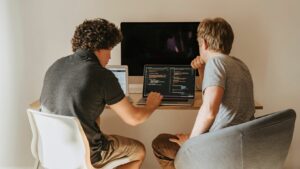Embarking on a journey into the realm of coding can be both thrilling and daunting. For beginners, grasping the core concepts of programming is crucial, and that’s where “Programming Foundations: Fundamentals” comes into play. This comprehensive course serves as a stepping stone for anyone looking to build a solid foundation in programming, offering a clear path through the often complex world of code.
The course breaks down fundamental programming principles in an easily digestible format, making it ideal for those who are just starting out. From understanding variables and data types to mastering logical flow and functions, it covers all the essentials that a budding programmer needs to know. By the end of the course, learners are not only equipped with the theoretical knowledge but also the practical skills to tackle more advanced programming challenges.
Watch Full Programming Foundations: Fundamentals
Key Concepts Covered
 The “Programming Foundations: Fundamentals” course comprehensively addresses essential topics that form the bedrock of coding. It delves into variables, introducing how they function as storage locations in programming that hold data which can change during the execution of a program. The course also explores various data types such as integers, strings, and booleans, crucial for defining the nature of data that can be stored in variables.
The “Programming Foundations: Fundamentals” course comprehensively addresses essential topics that form the bedrock of coding. It delves into variables, introducing how they function as storage locations in programming that hold data which can change during the execution of a program. The course also explores various data types such as integers, strings, and booleans, crucial for defining the nature of data that can be stored in variables.
Furthermore, logical flow—a fundamental aspect of programming that dictates the order in which code executes—is thoroughly explained. Learners gain insights into conditional statements, loops, and function calls, which are pivotal for building dynamic and efficient software. Functions are another major focus; they’re discussed in terms of their role in reducing redundancy, simplifying complex problems, and improving code reusability.
Target Audience
This course caters primarily to individuals who are new to programming and those seeking to solidify their understanding of basic concepts before advancing to more complex topics. Students, early career professionals, or even hobbyists interested in technology can benefit from this foundational course. Educators looking for structured content to introduce programming to novices will find this resource invaluable. By equipping learners with a robust understanding of fundamental programming principles, the course lays a sturdy groundwork for more advanced studies in coding.
In-Depth Analysis of Course Content
Quality of Tutorials
 The “Programming Foundations: Fundamentals” course offers tutorials that are both comprehensive and detailed, making complex programming concepts accessible to beginners. The tutorials focus on clarity and precision, using straightforward language that breaks down programming jargon. Each tutorial begins with a basic overview of the concept, followed by a step-by-step explanation, enhancing understanding for learners at all levels.
The “Programming Foundations: Fundamentals” course offers tutorials that are both comprehensive and detailed, making complex programming concepts accessible to beginners. The tutorials focus on clarity and precision, using straightforward language that breaks down programming jargon. Each tutorial begins with a basic overview of the concept, followed by a step-by-step explanation, enhancing understanding for learners at all levels.
Real-world relevance adds significant value to the tutorials, linking theoretical knowledge with practical applications. The explanations about variables make clear how these elements function as the building blocks of software, storing and processing data dynamically. Meanwhile, discussions on data types are tied directly to coding examples, showcasing how different data types can impact program behavior.
Moreover, the tutorials handle logical flow and functions effectively. They illustrate how conditions and loops dictate the sequence in which commands are executed, using pertinent examples. Functions are explained in the context of streamlining coding tasks and promoting efficient code reuse, critical skills for budding programmers.
Practical Exercises and Examples
 The course distinguishes itself with a wealth of practical exercises and real-life examples that reinforce learning. Exercises are carefully crafted to challenge students while ensuring they apply the theoretical knowledge gained through tutorials. Each exercise correlates with the tutorial subject, allowing students to implement and test their understanding in real programming scenarios.
The course distinguishes itself with a wealth of practical exercises and real-life examples that reinforce learning. Exercises are carefully crafted to challenge students while ensuring they apply the theoretical knowledge gained through tutorials. Each exercise correlates with the tutorial subject, allowing students to implement and test their understanding in real programming scenarios.
Examples are frequently updated to keep pace with technological advancements and programming trends. This ensures learners are familiarizing themselves with the most current practices and tools in the programming landscape. From constructing simple programs to apply basic principles such as variables and data types, to more complex tasks involving logical flows and functions, the course prepares students effectively for real-world programming challenges.
Students also benefit from interactive components where they can engage directly with the code, receiving instant feedback on their input. This interactive approach helps solidify the learning process, encouraging the exploration and resolution of common programming errors. As a result, students not only learn programming fundamentals but also develop critical troubleshooting skills.

